|
Introduction of Art
and Craft of Rajasthan |
|

Rajasthan Tours -
Most visited
Destinations of
India
Rajasthan is one of the most fascinating regions in
India, with one of the oldest civilizations and extremely rich cultural
heritage. The State of Rajasthan ........

North India Tours
The Northern part of India is full of diversities and wonders. North India
has got its brilliant past and lively present in the form of forts,
palaces and temples.....

East India Tours
East India comprises of 10 states mainly West Bengal, Sikkim, Orissa,
Bihar and some of the North eastern Hill States. They all lie in the
eastern part of India....

South India Tours
South India is made up of 4 states mainly Andhra Pradesh, Karnataka,
Kerala and Tamil Nadu. South India is famous for its natural beauty and
rich cultural....

Kerala Tours
Kerala, the god's own country is situated on the south western tip of
India. Kerala is one of the famous tourist destination in Asia and offers
everything to the tourists. Welcome.....

Gujarat Tours
Gujarat is one of the most diverse states in India. The state of Gujarat
is known all over the world for its holy temples, historic capitals,
wildlife sanctuaries, ......

Kashmir Tours
The Himalayan Valley of Kashmir is known all over the world for its beauty
and charm. The Jammu and Kashmir state is a very large State & comprises
of three distinct regions....

Himachal Pradesh Tours
Himachal Pradesh is situated in the heart of the western Himalayas. Shimla,
a beautiful hill station is the state capital of the Himachal Pradesh is
Shimla, largest city .....

Ladakh Tours
Ladakh is among the most beautiful places in the world which is situated
at a height of 3513 meters above sea level. Ladakh is situated on the
western end of end of the .....

NorthEast India Tour
The partition in 1947 was greatly responsible for the region’s separation
from India, but the tourism has been recently promoted in the
north-eastern....

Sikkim Tours
Within its area East India encapsulates some of the most striking
contrasts in the sub continent. Sikkim has so rich of flora, fauna and
diverse population as no .....

Nepal Tours
Nepal, the only Hindu kingdom of the world is situated between Tibet and
India. Kathmandu is the cultural and political centre of Nepal and is
magnificent for its wealth of unique .....

Bhutan Tours
Bhutan is among the most beautiful places in the world with its neighbors
India and China. Its official name, Druk Yul means "Land of Thunder
Dragon", portrayed on the flag....

Tibet Tours
Tibet is a homeland of six million people. The significance of Tibet
landscaping is not only the earth's highest mountains but also a vast arid
Plateau and majestic river valleys....

Adventure Tours
The adventure tours are the best way to explore the unexplored regions in
India. In these tours you will travel to the exotic mountain valleys,
experience Rafting in the Rivers of India....

Bird Watching Tours
Bird Watching means the activity of observing birds in their natural
habitat, where one can identify the birds and understand what they are
doing....

Wild Life Tours
The wildlife sanctuaries enables one to view the most unique animals and
birds existing in India and also have some close encounter with them. Ask
us for your tailor made....

Safari Tours
Safaris are the ideal way of exploring the land of India. The safari tours
will enable you to have a glimpse into the economic and social life of
people. Ask us for your tailor made .....

Temple Tours
India as a confluence of different religions has always attracted pilgrims
from all over the world. There are temples in every part of India. Get
your individual tailor made...

Learn Indian Languages
Indo Vacations has designed some exclusive language courses. Our array of
language programmes include courses in Hindi, Bengali, Gujarati,
Malayalam, Punjabi, ....

Indian Cookery
Indian Food has been rated by most of the cultures as one of the best food
available. Especially for vegetarians the travel to India is half worth to
enjoy the India food ....

Golf Tour
Golf had already been played in India for 59 years before the first major
course was opened in the USA in 1888. By the end of the 19th century India
already had a dozen ...

Group Departures
On this page you can make a request to join group tour by entering your
name for the desired date for the below mentioned specific group. Please
fill up all the required... |
|
Rajasthan
is among the richest state in India as far as the field of art and
craft is concerned. The richness of Rajasthan is so extraordinary
that it touches every aspect of life in the desert and semi desert
of Rajasthan and finds new meaning in the expressions of its
visitors. No matter whether you are here or there you will always
find some kind of interesting arts and crafts in this colorful
state. There have been collective efforts in remote villages of
Rajasthan where cooperative societies have also been set up by
non-government agencies to create opportunities for rural craftsmen
to get the maximum benefits of their skills by making reach their
products to the urban markets of not only in India but also other
countries abroad. This is also one of the reason that local village
products are available in the shops of big metropolitan cities
today. It is true that quality of many of the handicraft items have
got degraded to cater the demand of the tourists for the souvenir
market. But at the same time this is supportive for the local market
as some of the arts and crafts would have died without the tourists
as the local people would not be able to afford some of the
expensive products prepared originally for the rich and royals in
the past. The history of Rajasthan also reveals that the kings and
their nobles were patrons of art and crafts and they encouraged
their craftsmen in activities ranging from wood and marble carving
to weaving, pottery and painting. May be it was the result of the
war which sharpened the creative senses, artistic skills which
inspired the craftsmen of Rajasthan to create the most opulent and
richest of treasures. Rajasthan has created and preserved rich craft
heritage which includes fabulous fabrics in lovely prints, precious
and semi-precious stones, Kundan Meenakari Jewellery, embroidered
leather work, other hand crafted items of wood, ivory, lac, glass,
brass, silver and gold. Some of the popular crafts of Rajasthan are
Antiques, Blue Pottery, Carpets, Fabrics, Furniture, Leather ware,
Jewellery and Gem Stones, Metal Crafts, Paintings, Puppets and
Teracotta items. |
|
|
Popular
Arts and Crafts of Rajasthan |
|
|
|
Blue Pottery :
The Art of Blue Pottery was not local to India. The
tradition of quartz pottery was of Persian origin and
the artisans were invited by the former Maharaja of
Jaipur and he was so impressed by this culture that a
school of Blue Pottery was started. Blue pottery is made
of crushed quartz, fuller’s earth and sodium sulphite.
This combination is heated on high temperatures. Blue
pottery consist of hand painting in various shades of
blue. In the recent past new colors have been added such
as yellow, pink and green. Blue Pottery products are
available meanwhile in a wide range – to mention some
are: tiles, vases, bowls, mugs, urns, door knobs and
recent discovery is costume Jewellery that is getting
popular in the markets of western countries. Though not
easily approachable, there are many places who follow
the exact techniques and traditions that need to be
followed while making the Blue Pottery as initially
introduced. Our Guides & escorts would
be glad to escort you to the Blue Pottery studio where
you can see the work being done as under the royal
patronage in the olden time. |
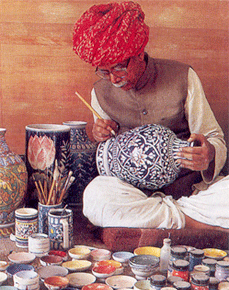 |
|
|
|
Durrie
|
|
|
|
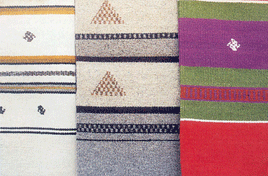 |
The Durrie is kind of thin and simple woven carpets which
were earlier used as a supporting material under big and
thick carpets in the royal houses. Common people used
them under their beds to keep them warm during the
winter. For big gathering as in the villages and small
town, whole community is invited at occasion of birth,
death or any family festival and it would not be
possible to have such big carpets as this would be very
expensive for normal people, so they used Durries (or
darris). There has been revival of this art as more
people can afford it and this has resulted in a large
colorful varieties.
In
many villages of Rajasthan you may find a large number of Houses
where the durrie are woven on the loom in vibrant designs and
motifs. |
|
A Durrie can be as simple as in a single color only
with a contrasting border. On the other hand due to demand there
are some durries with geometric motifs and floral patterns in a
mix of contrasting colors. Durries are also available in
different sizes. In places such as Bikaner and Jaisalmer, where
in winters the temperatures can dip very low, woolen durries are
also woven. In Bikaner camel hairs are also used to make
Durries which under the mattress keep your bed warm in the
chilling winters of the desert. |
|
|
|
Carpets |
|
|
|
The
art of carpet weaving in Rajasthan is a historical
royal tradition. In olden Royal days the carpets were
specially woven for royal palaces according to the
size of a particular room. However it was the Mughals
who brought the richness to the carpet weaving. Some
of the excellent examples can be still seen in the
city palace museum of Jaipur. Even in the Prisons of
Rajasthan special looms were erected and these carpets
became famous as so-called jail carpets. During the
olden royal days the weavers from Afghanistan were
brought to Jaipur to train the local people. This is
the reason that the hand knotted carpets of Jaipur
have so much in common with the Persian carpets in
regard to geometric motifs and the formal design.
There are many thousand of the families around Jaipur
as well as in other cities all over Rajasthan who are
specialized in one or another particular Designs and
producing the same with perfection. Jaipur has become
a big centre for the Carpets in whole of India. Many of the
exporters have their head offices here and all possible
motifs are available in their huge showrooms. We at
Rajasthan-Tour-Package can assist you further on the
carpets of Rajasthan. Please feel free to contact us !
|
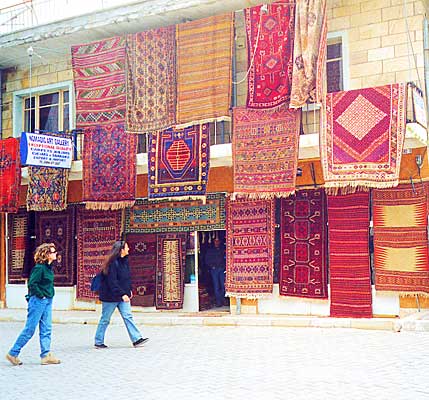 |
|
|
|
Textile |
|
|
|
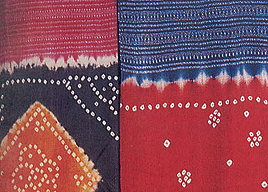 |
For
centuries, the printers in Rajasthan has perfected the
art of mixing vegetable dyes and mineral colors and the
results have been very promising. Some of the color
combinations are used in such a way that they look as if
they were always meant to be complementary to each
other. This Art of printing is used for the purpose of
home furnishing as well as for the personal clothing.
Each region of Rajasthan has its own designs and color
combinations which are used in such a way that a
geometric pattern is recognized easily. Some of the
famous area where this work takes place are Bagru and
Sanganer.
One
of the famous art of Rajasthan is known as tie-and-dye.
In this technique fabrics are tied into small twists
using a thread and then dipped into vats with their
array of bright colors to create a mosaic patterns
known as bandhani. This technique is used for sarees and
odhnis (a kind of shawl, used by the women of Rajasthan)
and by using this techniques different designs and
colors can be created. A famous design showing the
waves of different colors in known as Lahariya.
|
|
|
|
Colours
& Dyes of Rajasthan |
|
|
Being in the markets of Jaipur you really realize that
if you may have the made a mistake choosing the wrong
color of your newly bought dress or simply if would
like to change the color of your favorite cloths after
a while - it is not a big issue in Rajasthan. They can
simply be given to the Dyers who are in penalty here in
the Bazars of Rajasthan. There is an old tradition of
dying the materials in Rajasthan. However these
techniques have been given the boost by the growing
demands of the tourists especially for the colorful
objects. With some specific kind of dye even new papers
can be made look old – making the tourists happy
having bought an antique for such a less cost ! This is
known as aging process of papers. Vegetable colors for
paintings are obtained by the natural stones like lapis
or indigo. Even Gold is grinded to be used as the fine
Gold dust, as used in the precious miniature paintings.
For dying clothes the colors are obtained from flowers
and barks. Black colour from the sulphate of iron,
orange from saffron, yellow from myrobalan, purple from
mulberry, green from pistachio, blue from indigo are
some of the examples of obtaining the natural colours. |
|
|
|
Furniture
and Wood
Work |
|
|
Furniture and wood carving is not a very old tradition of
Rajasthan. It was very usual that even the royal courts were
held on the carpets and rugs while all the participants of
the court sit on the them. Earlier durbars (daily courts at
king's palace) were held on large mattresses spread on the
ground and covered with carpets and cushions for support. In
this old system a strict hierarchy was maintained, a
tradition that was retained even till later even during the
British regime involvement in Rajasthan. Some of the
interesting piece of furniture can be seen in the museums of
Rajasthan like in the Lalgarh museum of Bikaner ! Since
the tourists starting showing interest in the old furniture of Rajasthan,
there has been development of new techniques in which the new furniture is
made look like old furniture. Mostly in these areas you can find so called
old items in which windows, a part of carved Balconies, tables, chairs,
benches, swings, dressers is offered. As this kind of furniture was used
in the big Havellis by the rich business people of Rajasthan, some
interesting wooden and metal combinations are available in the markets
with decorative elements which are carved beautifully. For people
interested in buying the old or better to say “new as made old”
furniture of Rajasthan we at Indo Vacations recommend the cities like
Jaipur, Jodhpur as well as some areas of Shekhawati like Ramgarh. For more
information please do not hesitate to contact us.
Some more famous kind of furniture are like painted Chairs of Kishangarh,
the leather embroidered chairs of Tilonia, String-bottom chairs of
Shekhawati. Marble tops for tables also have been used highly in the
recent past. Though this art basically flourished after the construction
of Taj Mahal in Agra but the availability of good marble mines in
Rajasthan brought many of the artisans back to Rajasthan. |
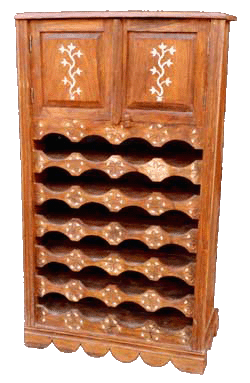 |
|
Wood Figures with carvings are also highly available in Rajasthan. Wood
Carving is done on different kind of woods. One of the option is using
mango wood which is not considered as good option. Some of the people use
the local Rohira wood which has its reputation for long lasting and being
termite free. Termite could really be danger for precious piece of wood
therefore, Rohira Wood gives you the peace of mind for your valuable
article. There is also a long tradition of doing carving on sandalwood.
Carving on Sandalwood is mostly done to create the figures of God and
Goddesses as these figures are used in the temples at home of local people
and admired as well by tourists due to the lovely sweet smell of the
sandalwood. There is also carving work available on the ivory which is
banned officially and we would not recommend you to buy such
articles, as import and export of ivory articles is prohibited and subject
to prosecution if caught. There are wonderful substitutes available like
paintings on marble plates and figures of camel bone. |
|
|
|
Gesso
Work |
|
|
In
Bikaner, the city which has perhaps the largest number of
camels in Rajasthan and with the only camel Farm of
Rajasthan there has been a kind of fine craft related to
camels which emerged here. In this kind of fine art they
used the inner hide (skin) of the camel which is scraped
till it has the consistency of paper and is translucent
(let the light get through) but not transparent. This is
then molded into different forms like lamp shades, frames,
perfume bottles or vases. And as an addition to beautify
this wonderful art it is painted over with fine colors to
make it look richer in its appearance. |
|
|
Jewellery
and Gemstones |
|
|
|
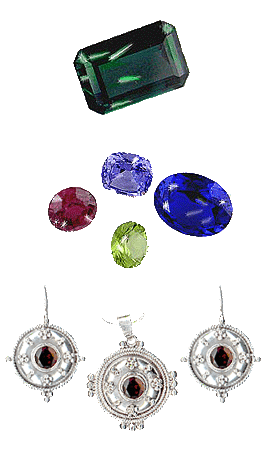 |
Rajasthan
is one of the largest centers in the world for
manufacturing of gems stones and jewellery. No where
perhaps in the world, such a large quantity and varieties
of gem stones are cut and polished as in Rajasthan. It is
not unusual to find shops and traders who have their shops
full of real gem stones that it seems hard to believe to
be real. There is every kind of stone which ranges from
economical semi precious stones till precious stones and
further as far as diamonds. To name, some of the stones
widely available in the markets of Rajasthan are:
Amethyst, Iolite, Aquamarine, Labradorite, Citrine, Black
Onyx, Lapis, Earrings, Garnet, Citrine, Moonstone,
Carneline, Peridot, Pendants Crystal, Rose Quartz, Garnet,
Green Venturine, Tourmaline, Green Onyx. Even
those who would not like to spend much would have the
temptation to take some stones home as most of the offers
are very so lucrative and the choice and colours available
are incredible. In no other part of the world can you have
the pleasure with the shopping the colour stones and
Jewellery so economically as in Rajasthan. The main centre
and big hub for the Semi-precious and precious Gemstone
and Jewellery is Jaipur, the capital of the state
Rajasthan as most of the cutting and polishing is done
here in and around Jaipur and there are also big units of
Jewellery manufacturing. Stones
are not only used in silver and gold jewellery but you
will also find a large verities of the necklaces made of
purely gemstones. Big Stones are best used for carving and
excellent shining figures are created out of them. A rough
rose-pink quartz may be seen getting turning to an
elephant. A good stone can be seen being shaped into a God
Krishna figure. The reason that Jaipur has become the hub
and a mega centre for the gemstones and related Jewellery
is that a vast number of people are still using the
ancient techniques to cut and polish the stone which are
governed by hand and by doing this way stone is held in
the hands and with great patience and a lot of time is
achieved by skill artisans that almost every part of the
rough stone is used in one or another form which is simply
not possible by using the fast working machines of the
modern stone industry. As India is still not the high
wages country, the production remains cheap and
competitive. |
|
|
|
Kundan
Meenakari |
|
|
Kundan
Meenakari is one of the art which is done proudly in Jaipur. This art
originated from the Rajputi times and since that Rajasthani people
have a kind of monopoly on it. Enameling is an art of using a
substance covering the surface of metal, pots or other objects to
decorate and beautify them. Enamel is applied when hot and cools to
give a hard glossy surface. The Rajputs rulers and royal families of
Rajasthan patronized the enameled form of Jewellery which is known
today as kundan. Today, Jaipur and to some extend Bikaner are the major
centers for Kundan. In this art precious stones and very often
diamonds, are set into gold artistically creating designs. Enamel work
is admired so highly that not only the Jewellery but also the boxes
used for the Jewellery and other precious objects, swords, bedrooms
tables are decorated with this wonderful work.
Visits to goldsmith’s studios can be organized with the help of
Rajasthan-Tour-Package who happen to have their head office in the capital (Jaipur)
of Rajasthan. We are sure you will find amazing to see these craftsmen
working in amazingly low lighted surroundings and using only few basic
tools, mostly unsophisticated for the western standard but creating
some of the finest valuable items of the wonderful Jewellery world of
Rajasthan.
The art of setting the Jewellery in Rajasthan is done with such fine
details that its not one craft man who has the commend over the whole
work but many specializing in their own filed of jewellery settings.
Some of the them are mentioned here in brief:
Chhaterra
is a person whose task is to engrave the ground on which the
stones setting takes place.
Kundansaaz is a person who sets the uncut stones on the made surface
and gives the shape and while cooling the still hot precious material
is sat in the final shape while hammering putting gold wire around.
Manihar
is person who prepares the enamels that will be poured into
the hollows to create the patterns. In Jaipur a whole street is
dedicated to the people of this community.
Minakaar is so called enameller who places the enamels and fires them
individually.
Nyarriya is a person whose task is to refine the gold. Usually 22
carat gold is used for the making of kundan jewellery. 24 caret would
be too delicate.
Patwari is the person who provides the finishing touch in the form of
the gold and silk cord required by the wearer and is also responsible
for stringing the beads, wherever required in the existing designs.
Sangsaza is the person whose job is to polish, cut and if needed to
carve the stone with wished decorative motifs.
Sonar or Sunar
is the goldsmith who prepares the bezels and moulds in
Gold for setting the stones. He also does the polishing and cleaning
of the jewellery once the peace is completed so that way also
responsible for the quality control. |
|
|
Leather Ware |
|
|
|
he hides (skin) of dead animals have never found a better
application than in Rajasthan. Considering the fact that
animals are not killed to get the leather but only the
leather of the animals is used who died in nature for
whatsoever cause. The skin of dead camels is used as leather
material for the traditional shoes (known as Jutties),
saddles for camels and horses as well for making beautiful
bags and pouches. The leather has been also used making the
back of the resting chairs with embroidery work. The most
interesting part of it remains how the leather is beaten,
tanned, dyed, stitched and as a last effect also
embroidered. The way of the workmanship might look primitive
but the finished products are very individual and give the
impression of perfection of their work. The Guides of
Rajasthan-Tour-Package would be glad to tell and show you more about the
leather manufacturing in Rajasthan. |
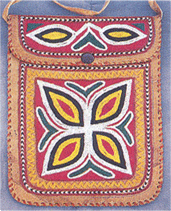 |
|
|
|
Metal Crafts |
|
|
|
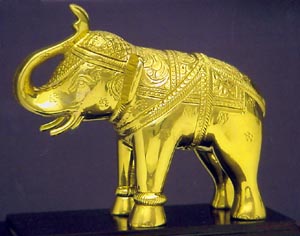 |
The
Craftsmanship of the metalwork would have not reached its highlights
without the need of Rajputi warriors of having not only good
functioning but also good looking arms. Some of the museums in Jaipur,
Jodhpur and Bikaner have the finest examples of the arms collection
which are combination of metal and other materials like wood and ivory
studded with gem stones and having the base of silver and gold. This
development has leaded to the enormous decorative pieces like a range
of soldiers of the local army, a group of musicians, animals figures,
mostly camels and elephants and some of them so look so real and huge
as they used to be the main decorative pieces in the royal living
rooms. Metal Table tops with floral work on it are some of the further
examples of the metal craftsmanship of Rajasthan. |
|
|
|
Paintings |
|
|
|
Painting
of Rajasthan have made the state famous not only in the country itself
but also abroad. Especially the Rajputi and Mogul court scenes,
romantic pairs and bathing princesses and festival celebrations are
the most sought after motifs from the buyers. No matter in which area
of Rajasthan you are – you can not be left unimpressed by the affect
of the master painters. There are many different techniques which are
used while making the paintings. Painters use brushes which are made
out of the squirrel’s hair, the finest hair considered for hand
paintings. Most popular areas where the paintings are considered as
the art is the city of Udaipur and Jaipur in Rajasthan. These are the
cities where miniature artists continue to create their incredible
portfolios of scenes from myths, legends as well as of historical
happenings. Though there are cheaper versions of the chemical and
synthetic colors but still the use of high valued traditional mineral
and vegetable dyes remain unmatched for its quality – though they
are expensive and should not be compared with the products available
at every street corner. The
reason that the miniature paintings of Rajasthan have become
so famous is that the fine work with details in it. Every
gesture and activity is worked so fine that this is next to
its liveliness. The figures in the paintings seem to have
their own body language and conveying the messages.
|
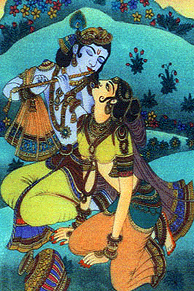 |
|
Some
of the famous schools of Paintings in Rajasthan are Kishangarh,
Nathdwara, Jaipur and the Udaipur being the most famous. Ivory was
also used as the base material in early days as much loved by the
aristocrats and the rich ones. Since recent past it is no more allowed
to use ivory and as substitute camel bones and high quality white
marble plates are being used. Silk and Canvases are also being used as
the base for the miniature paintings. (Canvas has longer life than the
silk). Some of the finest works describe the nature in its full form
whether being just flowers, trees, wild animals or birds. Recently the
old traditions of making paintings with precious stones have been
revived and finished products are getting very popular as most of them
are affordable for everyone. However the highlight remains the
miniature paintings from Udaipur on the old rice paper, silk and camel
bones. We at Rajasthan-Tour-Package also organize the short and long painting
courses as well as take you to the traditional painting schools of
Rajasthan. For more information please contact us describing your
wishes. |
|
|
|
Gemstone Painting
|
|
|
|
.JPG) |
Gemstone
Painting is an indigenous painting technique which stands among the
most sought after handicraft products from India. These glass
paintings are unique in themselves as the colors used in them are not
ordinary colors rather these are powders of real semi precious stones
like garnet, amethyst, cornelian agate, jasper, onyx, chalcedony etc.
as a result these paintings are long lasting and retain their colour
for many years These paintings are real blend of artist’s
meticulousness and imagination. |
|
|
|
Puppets |
|
|
| The
art of making the puppets has a long tradition in Rajasthan. But these
are not only the puppets who has made them famous but, also the people
who decorate and dress and finally make them dance before the public.
Most of the puppets consist of painted wood and are dressed as per the
local customs of the city or area where they are made. The most
vibrant aspect of these puppets is the way their expressions are
painted, large expressive eyes with arched eyebrows, and a curling
moustache for men, or a nose ring for the women are the typical style
of Rajasthani Puppet. The most famous puppets are the folk heroes,
Kings, queens and the royal court members. Snake Charmer and the dance
with the young lady is one of the integrated part of any puppet show.
The puppet masters are expert in pulling and releasing the strings to
make puppet dance and background music add an extra to the whole of
atmosphere. One of the best shows in Rajasthan take place in Udaipur
at Lok Kala Mandal. There is also a puppet museum there. For tourists
who are visiting Udaipur we at Rajasthan-Tour-Package recommend to visit the
museum and ask for the show which takes place frequently even on
demand. |
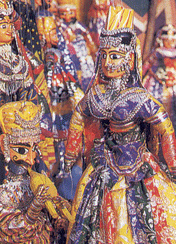 |
|
|
|
Stone
Carving |
|
|
In
the desert and semi desert of Rajasthan, if there is any thing in
penalty that is stone. Everything from pink, yellow and red sandstone
to the excellent quality of marble, tamara and chlorite are available
in Rajasthan as the art of stone carving flourished here under the
patronage of the Rajput rulers. Some of the stone workers work with
such comfort that stone in their hands appear as they were working on
wood. Some of the areas have made their name in stone carving. To Name
a few are Dholpur near Bharatipur to Barmer in the heart of the
desert, Marble statues are carved at their best in Jaipur - making the
city again a hub for the exporters and importers. The area of Sikandra
near Dausa in Rajasthan has also a great number of people working with
the sandstone. The Team of
Rajasthan-Tour-Package would be glad to provide you
further information on stone carving. |
|
|
Terracotta |
|
|
|
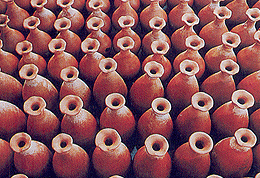 |
Terracotta
has an old tradition in Rajasthan. Even today in many of the villages
women still cook in terracotta pots over wood fires. Terracotta and
clay pots are normally used for the storage of water as the slow
evaporation through the porous clay helps in eliminating the
surrounding heat and thus keeps the water cool even in the hottest
temperature of Rajasthan. However once the pores are filled with the
deposits the effect of cooling is less effective and a new earthen pot
is needed in next summer. This is one of the example how a village
economy keeps working. Terracotta earthen pots are available in
different sizes and some times with white colorful designs on it to
make it more beautiful. In almost all the villages the traditions of
making and using clay pottery can be seen.
|
|
However artists of Udaipur have developed this culture into
a fine art. In Udaipur, Potters are using the clay not
only to create just pots but also objects of art such as warriors
fighting on horses, elephants with the soldiers being just some of the
examples. Terracotta is also used to make figures of religious scenes
as well as historic ones. The only biggest obstacle has been for
Terracotta that the transportation needs a lot of care. As material,
Terracotta is fragile being the original material clay. However the
Terracotta lovers find their way with the help of wooden trunks to
carry them safely even far away to distant countries. This all seems
to be worth once a Terracotta article is allotted its final place in a
living room. |
|
|
|
|
|
|































